Unit 4 Then and now 期末复习课件(共16张PPT)
文档属性
| 名称 | Unit 4 Then and now 期末复习课件(共16张PPT) |  | |
| 格式 | zip | ||
| 文件大小 | 514.5KB | ||
| 资源类型 | 教案 | ||
| 版本资源 | 牛津译林版 | ||
| 科目 | 英语 | ||
| 更新时间 | 2022-10-17 21:04:05 | ||
图片预览


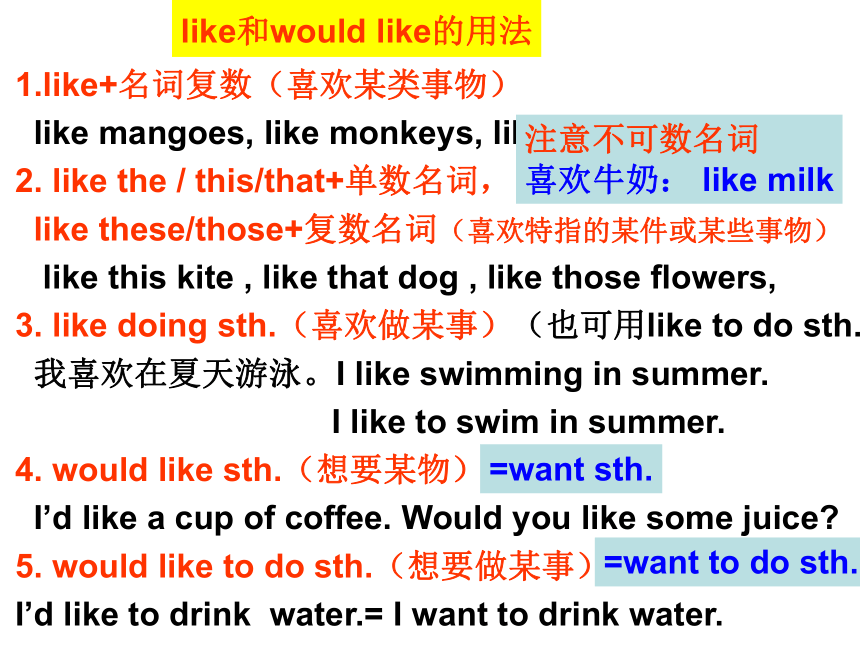
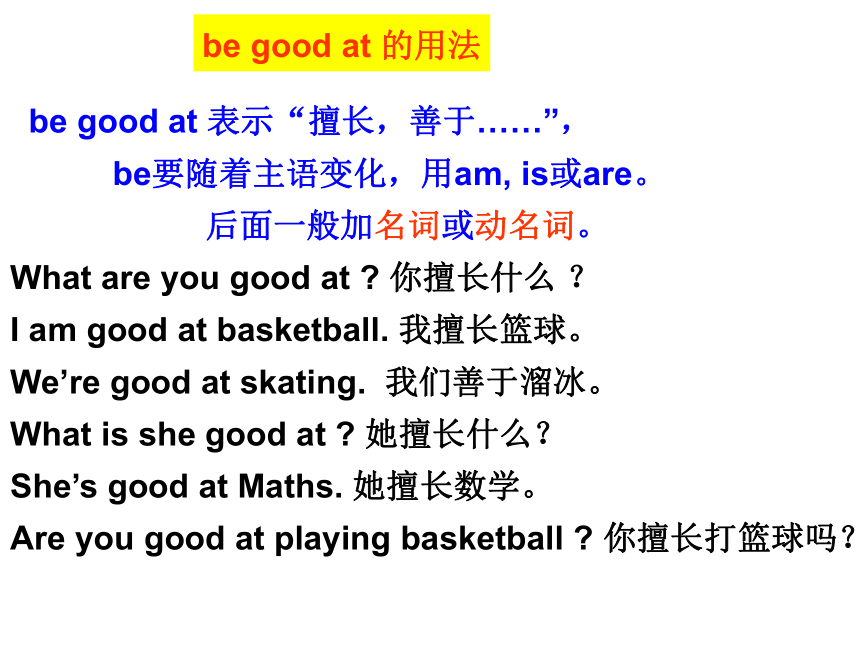
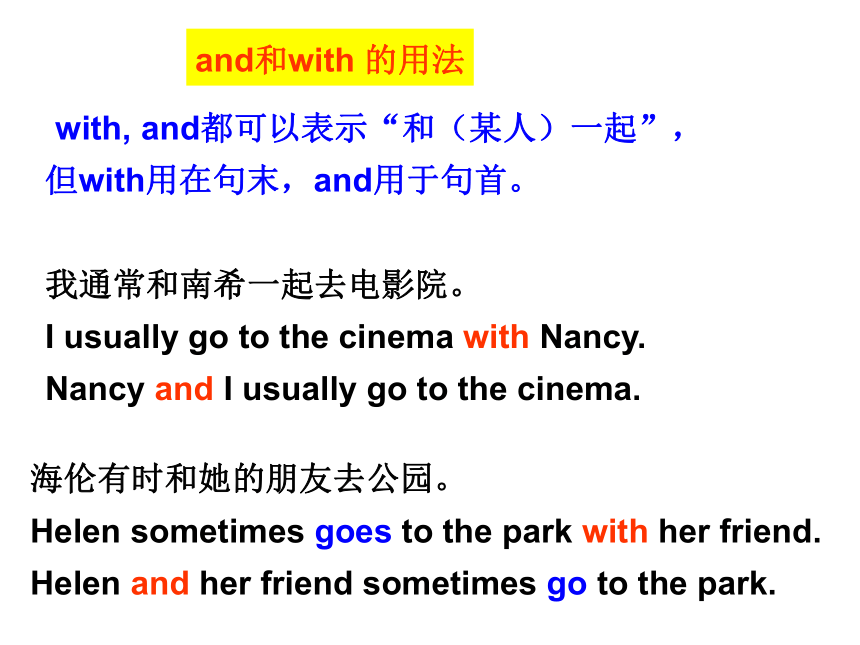
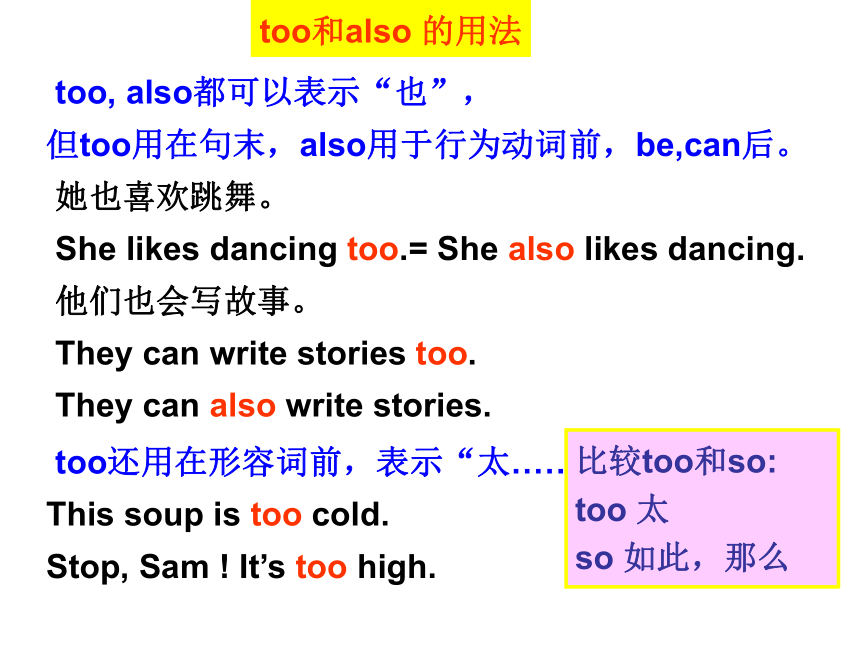
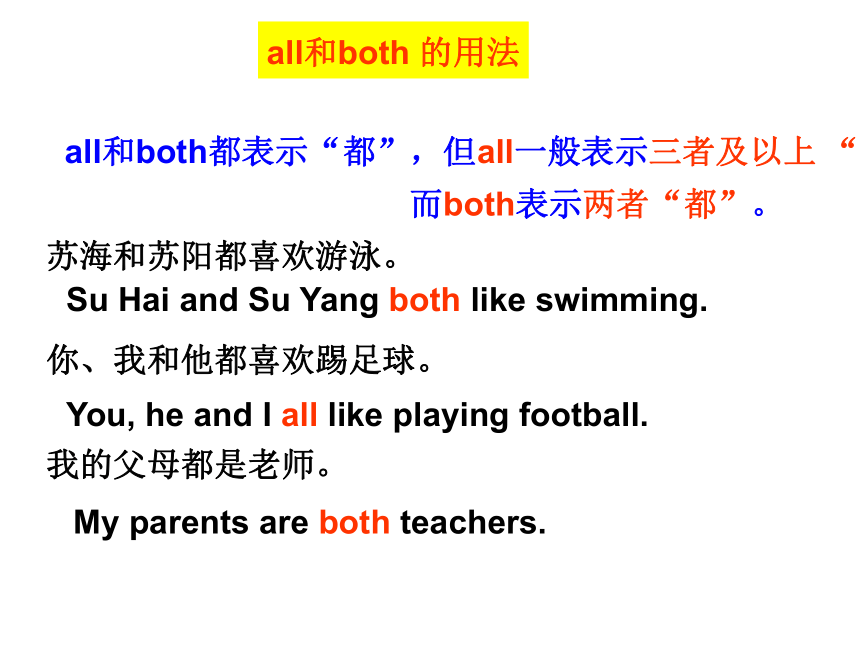
文档简介
(共16张PPT)
read→reading
draw→drawing
sing→singing
play→playing
dance→dancing
come →coming
make →making
have →having
skate→skating
write →writing
swim→swimming
run→running
sit→sitting
chat→chatting
shop→shopping
get → getting
1.一般在动词后直接加 ing。
2.以不发音的字母e结尾的动词,去 e再加 ing。
3.以重读闭音节结尾的动词,双写末尾字母再加 ing。
Rules(规则):
1.like+名词复数(喜欢某类事物)
like mangoes, like monkeys, like dolls
2. like the / this/that+单数名词,
like these/those+复数名词(喜欢特指的某件或某些事物)
like this kite , like that dog , like those flowers,
3. like doing sth.(喜欢做某事)(也可用like to do sth.)
我喜欢在夏天游泳。I like swimming in summer.
I like to swim in summer.
4. would like sth.(想要某物)
I’d like a cup of coffee. Would you like some juice
5. would like to do sth.(想要做某事)
I’d like to drink water.= I want to drink water.
like和would like的用法
=want sth.
=want to do sth.
注意不可数名词
喜欢牛奶: like milk
be good at 表示“擅长,善于……”,
be要随着主语变化,用am, is或are。
后面一般加名词或动名词。
What are you good at 你擅长什么 ?
I am good at basketball. 我擅长篮球。
We’re good at skating. 我们善于溜冰。
What is she good at 她擅长什么?
She’s good at Maths. 她擅长数学。
Are you good at playing basketball 你擅长打篮球吗?
be good at 的用法
with, and都可以表示“和(某人)一起”,
但with用在句末,and用于句首。
我通常和南希一起去电影院。
I usually go to the cinema with Nancy.
Nancy and I usually go to the cinema.
and和with 的用法
海伦有时和她的朋友去公园。
Helen sometimes goes to the park with her friend.
Helen and her friend sometimes go to the park.
too, also都可以表示“也”,
但too用在句末,also用于行为动词前,be,can后。
她也喜欢跳舞。
She likes dancing too.= She also likes dancing.
他们也会写故事。
They can write stories too.
They can also write stories.
too和also 的用法
too还用在形容词前,表示“太……”
This soup is too cold.
Stop, Sam ! It’s too high.
比较too和so:
too 太
so 如此,那么
all和both都表示“都”,但all一般表示三者及以上 “都”,
而both表示两者“都”。
苏海和苏阳都喜欢游泳。
你、我和他都喜欢踢足球。
我的父母都是老师。
all和both 的用法
You, he and I all like playing football.
Su Hai and Su Yang both like swimming.
My parents are both teachers.
Let’s ______ (play) football in the playground.
Don’t ______(close) the door, it’s too hot.
Can your father ______(ride) a horse No, he can’t.
What can you do I can_______.
I’m good at _________. (dance)
5. It’s time______ (have) dinner. Let’s ___ (go) home.
6. Do you like ________ Yes,but I can’t ___well.(swim)
7. I’m thirsty. I’d like _______(drink) some water.
8. We usually go ________(climb) and ________(boat)
in autumn.
9. She likes _____ (go) _______(run) in winter.
swimming
close
ride
dance
dancing
to have
go
play
swim
to drink
climbing
boating
going
running
1. 含有情态动词can, may的句子, 动词用原形。
2. 含有please, don’t, let’s , shall we的祈使句,动词用原形。
3. Let sb. do 让某人做某事。
1. like doing ,表示“喜欢做某事”。
2. be good at doing,表示“擅长做某事”
3. go doing,表示“去做某事”。
4. My hobby is swimming.
1. would like to do=want to do ,表示“想要做某事”。
2. It’s time to do 表示“该做某事了”。
What can it do It can flying.
I’m hungry. Please giving me some pies.
Are you good at Music Yes, I’m good at sing.
Would you like come to my house this Sunday
Let’s go and dancing today.
Do you have any hobbies Yes, I like draw and run.
What does she likes doing Reading.
Does the panda has a fat body Yes, it does.
The boys like playing football, but the girls doesn’t.
Does the ducks have wings Yes.
fly
give
singing
to come
go dancing / go and dance
drawing and running
like
have
don’t
Do
肯定句: 主语+ like…
否定句:主语+don’t like…
一般疑问句: Do+主语+like…
回答:Yes, …do. / No, …don’t.
特殊疑问句What do +主语+like doing
The boys like flying kites.
The boys don’t like flying kites .
Do the boys like flying kites
Yes, they do. / No, they don’t.
What do the boys like doing
在一般现在时态中,当主语为第一、二人称单数或复数时,
动词用原形,“喜欢”用like。
肯定句:主语+ likes…
否定句:主语+doesn’t like…
一般疑问句:Does+主语+like…
回答:Yes, …does. / No, …doesn’t.
特殊疑问句:What does +主语+ like doing?
在一般现在时态中,当主语为第三单数时,
动词用三单式,“喜欢”用likes。
She likes singing.
She doesn’t like singing.
Does she like singing
Yes, she does. / No, she doesn’t.
What does she like doing
那些孩子喜欢看故事书。
The children like reading storybooks.
The children don’t like reading storybooks.
Do the children like reading storybooks
Yes, they do. / No, they don’t.
What do the children like doing
格林先生喜欢看电影 。
Mr Green likes watching films.
Mr Green doesn’t like watching films.
Does Mr Green like watching films
Yes, he does. / No, he doesn’t.
What does Mr Green like doing
我阿姨喜欢做蛋糕 。
My aunt likes making cakes.
My aunt doesn’t like making cakes.
Does your aunt like making cakes
Yes, she does. / No, she doesn’t.
What does your aunt like doing
有许多爱好
喜欢游泳和溜冰
喜欢看电影
擅长打篮球
擅长数学
和我们一起去爬山
和她一起做蛋糕
想要放风筝
钢琴弹得很好
唱歌跳舞
两只手和十个手指
没有腿和手臂
它的瘦瘦的身体
它的名字
have many hobbies
like swimming and skating
like watching films
be good at playing basketball
be good at Maths
go climbing with us
make cakes with her
would like to / want to fly kites
play the piano very well
sing and dance
two hands and ten fingers
have no legs or arms
its thin body
its name
read→reading
draw→drawing
sing→singing
play→playing
dance→dancing
come →coming
make →making
have →having
skate→skating
write →writing
swim→swimming
run→running
sit→sitting
chat→chatting
shop→shopping
get → getting
1.一般在动词后直接加 ing。
2.以不发音的字母e结尾的动词,去 e再加 ing。
3.以重读闭音节结尾的动词,双写末尾字母再加 ing。
Rules(规则):
1.like+名词复数(喜欢某类事物)
like mangoes, like monkeys, like dolls
2. like the / this/that+单数名词,
like these/those+复数名词(喜欢特指的某件或某些事物)
like this kite , like that dog , like those flowers,
3. like doing sth.(喜欢做某事)(也可用like to do sth.)
我喜欢在夏天游泳。I like swimming in summer.
I like to swim in summer.
4. would like sth.(想要某物)
I’d like a cup of coffee. Would you like some juice
5. would like to do sth.(想要做某事)
I’d like to drink water.= I want to drink water.
like和would like的用法
=want sth.
=want to do sth.
注意不可数名词
喜欢牛奶: like milk
be good at 表示“擅长,善于……”,
be要随着主语变化,用am, is或are。
后面一般加名词或动名词。
What are you good at 你擅长什么 ?
I am good at basketball. 我擅长篮球。
We’re good at skating. 我们善于溜冰。
What is she good at 她擅长什么?
She’s good at Maths. 她擅长数学。
Are you good at playing basketball 你擅长打篮球吗?
be good at 的用法
with, and都可以表示“和(某人)一起”,
但with用在句末,and用于句首。
我通常和南希一起去电影院。
I usually go to the cinema with Nancy.
Nancy and I usually go to the cinema.
and和with 的用法
海伦有时和她的朋友去公园。
Helen sometimes goes to the park with her friend.
Helen and her friend sometimes go to the park.
too, also都可以表示“也”,
但too用在句末,also用于行为动词前,be,can后。
她也喜欢跳舞。
She likes dancing too.= She also likes dancing.
他们也会写故事。
They can write stories too.
They can also write stories.
too和also 的用法
too还用在形容词前,表示“太……”
This soup is too cold.
Stop, Sam ! It’s too high.
比较too和so:
too 太
so 如此,那么
all和both都表示“都”,但all一般表示三者及以上 “都”,
而both表示两者“都”。
苏海和苏阳都喜欢游泳。
你、我和他都喜欢踢足球。
我的父母都是老师。
all和both 的用法
You, he and I all like playing football.
Su Hai and Su Yang both like swimming.
My parents are both teachers.
Let’s ______ (play) football in the playground.
Don’t ______(close) the door, it’s too hot.
Can your father ______(ride) a horse No, he can’t.
What can you do I can_______.
I’m good at _________. (dance)
5. It’s time______ (have) dinner. Let’s ___ (go) home.
6. Do you like ________ Yes,but I can’t ___well.(swim)
7. I’m thirsty. I’d like _______(drink) some water.
8. We usually go ________(climb) and ________(boat)
in autumn.
9. She likes _____ (go) _______(run) in winter.
swimming
close
ride
dance
dancing
to have
go
play
swim
to drink
climbing
boating
going
running
1. 含有情态动词can, may的句子, 动词用原形。
2. 含有please, don’t, let’s , shall we的祈使句,动词用原形。
3. Let sb. do 让某人做某事。
1. like doing ,表示“喜欢做某事”。
2. be good at doing,表示“擅长做某事”
3. go doing,表示“去做某事”。
4. My hobby is swimming.
1. would like to do=want to do ,表示“想要做某事”。
2. It’s time to do 表示“该做某事了”。
What can it do It can flying.
I’m hungry. Please giving me some pies.
Are you good at Music Yes, I’m good at sing.
Would you like come to my house this Sunday
Let’s go and dancing today.
Do you have any hobbies Yes, I like draw and run.
What does she likes doing Reading.
Does the panda has a fat body Yes, it does.
The boys like playing football, but the girls doesn’t.
Does the ducks have wings Yes.
fly
give
singing
to come
go dancing / go and dance
drawing and running
like
have
don’t
Do
肯定句: 主语+ like…
否定句:主语+don’t like…
一般疑问句: Do+主语+like…
回答:Yes, …do. / No, …don’t.
特殊疑问句What do +主语+like doing
The boys like flying kites.
The boys don’t like flying kites .
Do the boys like flying kites
Yes, they do. / No, they don’t.
What do the boys like doing
在一般现在时态中,当主语为第一、二人称单数或复数时,
动词用原形,“喜欢”用like。
肯定句:主语+ likes…
否定句:主语+doesn’t like…
一般疑问句:Does+主语+like…
回答:Yes, …does. / No, …doesn’t.
特殊疑问句:What does +主语+ like doing?
在一般现在时态中,当主语为第三单数时,
动词用三单式,“喜欢”用likes。
She likes singing.
She doesn’t like singing.
Does she like singing
Yes, she does. / No, she doesn’t.
What does she like doing
那些孩子喜欢看故事书。
The children like reading storybooks.
The children don’t like reading storybooks.
Do the children like reading storybooks
Yes, they do. / No, they don’t.
What do the children like doing
格林先生喜欢看电影 。
Mr Green likes watching films.
Mr Green doesn’t like watching films.
Does Mr Green like watching films
Yes, he does. / No, he doesn’t.
What does Mr Green like doing
我阿姨喜欢做蛋糕 。
My aunt likes making cakes.
My aunt doesn’t like making cakes.
Does your aunt like making cakes
Yes, she does. / No, she doesn’t.
What does your aunt like doing
有许多爱好
喜欢游泳和溜冰
喜欢看电影
擅长打篮球
擅长数学
和我们一起去爬山
和她一起做蛋糕
想要放风筝
钢琴弹得很好
唱歌跳舞
两只手和十个手指
没有腿和手臂
它的瘦瘦的身体
它的名字
have many hobbies
like swimming and skating
like watching films
be good at playing basketball
be good at Maths
go climbing with us
make cakes with her
would like to / want to fly kites
play the piano very well
sing and dance
two hands and ten fingers
have no legs or arms
its thin body
its name
